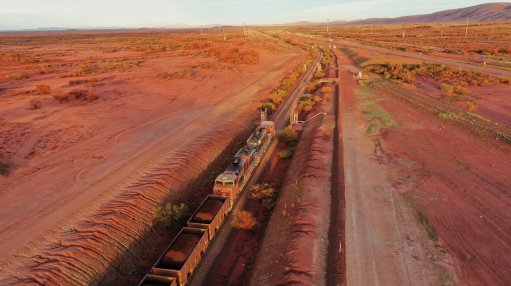Court order hampers Scarborough development
PERTH (miningweekly.com) – The National Offshore Petroleum Safety and Environmental Management Authority (Nopsema) this week said that it will review a Federal Court decision which found that an environmental plan for part of energy major Woodside’s Scarborough development is not legally approved and is therefore invalid.
The ruling on Thursday relates to a seismic survey plan, with a traditional owner arguing that she had not been adequately consulted during the environmental process. The Federal Court found that the environmental approval for the seismic survey was invalid, meaning Woodside would not be allowed to carry out the testing until the company has submitted a new environmental plan, which would need regulatory approval.
The Scarborough and Pluto Train 2 developments are expected to cost a combined $12-billion, with Woodside’s share of capital expenditure amounting to $6.9-billion. First liquefied natural gas (LNG) cargo from Scarborough is targeted for 2026.
“Nopsema recognises the important role that First Nations people have in giving input to, and participating in, the protection of the environment and cultural heritage. Nopsema was not reasonably satisfied that all environmental risks and impacts had been identified and therefore the Scarborough seismic environment plan could not be accepted without applying conditions,” the watchdog said in a statement this week.
“The Authority took a decision to seek advice to support the delegate proceeding to make a decision given potential ambiguity in the reading of the environment regulations. Nopsema provided procedural fairness to Woodside by enabling a review of the draft conditions prior to the decision being issued. This was in accordance with administrative law requirements. Woodside did not seek a review of the grounds of acceptance with conditions.
“Nopsema cannot comment on the specifics of the Scarborough environment plan as it returns to the assessment process following the court’s decision,” it added.
Woodside on Friday told Mining Weekly Online that the Federal Court ruling would not impact the schedule or the cost for the Scarborough project.
“We note the decision by the Federal Court which held that Nopsema’s decision to accept the Scarborough project’s 4D B1 Marine Seismic Survey Environment Plan (EP) with conditions was an invalid exercise of its powers,” a spokesperson told Mining Weekly Online.
“The court decision focuses on the scope of Nopsema’s decision-making power in relation to EPs. We will continue to work with Nopsema to have an accepted EP in place before commencing the seismic survey.
“We have dedicated significant time and effort to consult extensively on our EPs. We are continuing our engagements with all relevant stakeholders on the seismic survey EP and our other project EPs.“
Industry body Australian Energy Producers said this week that Australia’s reputation among international investors centres on its ability to provide certainty and stability, both of which are important for the country’s global competitiveness and valued long-term relationships with international customers and investors.
“Important energy projects which are following the rules, consulting in good faith and being granted approvals by the regulator are being impacted because unclear regulations and the application of them are effectively changing the goal posts. The time delays and costs incurred are substantial,” said CEO Samantah McCulloch.
“More obstacles are being put in the way of critical energy developments, risking the new supply needed to deliver domestic energy security, emissions reductions and substantial economic returns for Australians.
“Comprehensive and effective consultation with Traditional Owners and landholders has been an important part of the work of Australia’s oil and gas industry going back decades.
"Regulations which provide clarity and certainty for industry while maintaining consultation obligations are desperately needed.
“Governments must make clear regulations for consultation that maintain high standards of consultation with stakeholders, including Traditional Owners, but also provide regulatory certainty when an approval is granted,” McCulloch said.
“Investors in Australia’s resources sector face increasing approvals uncertainty after today’s court decision, compounding the uncertainty stemming from last year’s decision against a regulatory approval for the Santos Barossa project.”
Nopsema earlier ordered Santos to pause construction on its A$4.7-billion Barrossa gas project owing to potential risks to Aboriginal cultural sites.
Nopsema directed Santos to obtain further information about the potential impacts of the operation on any underwater cultural heritage places along the Barossa pipeline route.
Santos last year lost an appeal in the Full Federal Court against a decision last year by the Federal Court to set aside the acceptance by Nopsema of an environmental plan covering the drilling and completion activities in relation to the Barossa gas project.
The Federal Court’s decision was based on a finding that Nopsema could not be lawfully satisfied that the drilling environment plan met the criteria required by the regulations and in particular failed to assess whether the drilling environment plan demonstrated that Santos consulted with each person that it was required by the regulations to consult with.
The Barossa project comprises a floating production, storage and offloading vessel, subsea production wells, supporting subsea infrastructure and a gas export pipeline tied into the existing Bayu-Undan to Darwin LNG pipeline.
Article Enquiry
Email Article
Save Article
Feedback
To advertise email advertising@creamermedia.co.za or click here
Press Office
Announcements
What's On
Subscribe to improve your user experience...
Option 1 (equivalent of R125 a month):
Receive a weekly copy of Creamer Media's Engineering News & Mining Weekly magazine
(print copy for those in South Africa and e-magazine for those outside of South Africa)
Receive daily email newsletters
Access to full search results
Access archive of magazine back copies
Access to Projects in Progress
Access to ONE Research Report of your choice in PDF format
Option 2 (equivalent of R375 a month):
All benefits from Option 1
PLUS
Access to Creamer Media's Research Channel Africa for ALL Research Reports, in PDF format, on various industrial and mining sectors
including Electricity; Water; Energy Transition; Hydrogen; Roads, Rail and Ports; Coal; Gold; Platinum; Battery Metals; etc.
Already a subscriber?
Forgotten your password?
Receive weekly copy of Creamer Media's Engineering News & Mining Weekly magazine (print copy for those in South Africa and e-magazine for those outside of South Africa)
➕
Recieve daily email newsletters
➕
Access to full search results
➕
Access archive of magazine back copies
➕
Access to Projects in Progress
➕
Access to ONE Research Report of your choice in PDF format
RESEARCH CHANNEL AFRICA
R4500 (equivalent of R375 a month)
SUBSCRIBEAll benefits from Option 1
➕
Access to Creamer Media's Research Channel Africa for ALL Research Reports on various industrial and mining sectors, in PDF format, including on:
Electricity
➕
Water
➕
Energy Transition
➕
Hydrogen
➕
Roads, Rail and Ports
➕
Coal
➕
Gold
➕
Platinum
➕
Battery Metals
➕
etc.
Receive all benefits from Option 1 or Option 2 delivered to numerous people at your company
➕
Multiple User names and Passwords for simultaneous log-ins
➕
Intranet integration access to all in your organisation





















